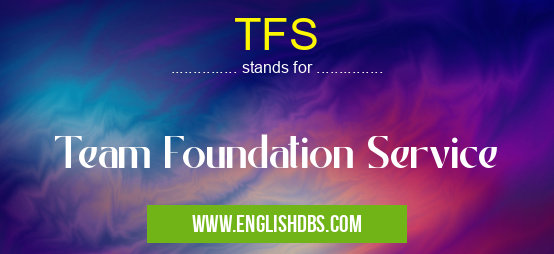What does TFS mean in FOUNDATIONS
Team Foundation Service (TFS) is a comprehensive set of tools for software development and collaboration. It offers a range of features to support the entire software development lifecycle, from planning and requirements management to coding, testing, and deployment. TFS is designed to help teams work together more efficiently and effectively, and it can be used for both on-premises and cloud-based deployments.

TFS meaning in Foundations in Miscellaneous
TFS mostly used in an acronym Foundations in Category Miscellaneous that means Team Foundation Service
Shorthand: TFS,
Full Form: Team Foundation Service
For more information of "Team Foundation Service", see the section below.
Key Features
TFS includes a wide range of features, including:
- Version control: TFS provides a centralized repository for storing and managing code, enabling teams to work together on the same project without overwriting each other's changes.
- Issue tracking: TFS allows teams to track and manage issues, such as bugs and feature requests. Each issue can be assigned to a specific team member or group, and tracked through its lifecycle.
- Test management: TFS provides tools for creating and managing test cases, and for running tests automatically. This can help teams to ensure that their software is working as expected.
- Build management: TFS can be used to automate the build process, including compiling code, running tests, and creating deployment packages. This can help teams to save time and reduce errors.
- Requirements management: TFS includes tools for capturing and managing software requirements. This can help teams to ensure that their software meets the needs of their users.
Benefits of Using TFS
There are many benefits to using TFS, including:
- Improved collaboration: TFS helps teams to collaborate more efficiently by providing a central platform for sharing code, tracking progress, and communicating with each other.
- Reduced errors: TFS can help to reduce errors by providing tools for automated testing and build management.
- Increased productivity: TFS can help teams to save time by automating tasks such as the build process and issue tracking.
- Improved quality: TFS can help teams to improve the quality of their software by providing tools for requirements management and test management.
Essential Questions and Answers on Team Foundation Service in "MISCELLANEOUS»FOUNDATIONS"
What is Team Foundation Service (TFS)?
TFS is a cloud-based version control, collaboration, and project management platform from Microsoft. It provides a comprehensive suite of tools for software development teams to manage their work, track progress, and improve productivity.
What are the key features of TFS?
Key features of TFS include:
- Version control: Git and TFVC version control systems for tracking code changes.
- Agile planning and tracking: Scrum and Kanban boards for managing projects and tracking progress.
- Continuous integration and delivery (CI/CD): Automated build, test, and deployment pipelines to streamline software delivery.
- Team collaboration: Chat, video conferencing, and real-time updates to facilitate team communication and collaboration.
- Reporting and analytics: Customizable dashboards and reports to provide insights into project status and team performance.
What are the benefits of using TFS?
Benefits of using TFS include:
- Improved collaboration: Centralized platform for team communication and project management.
- Increased productivity: Automated workflows and streamlined processes to free up time for development.
- Enhanced software quality: Continuous integration and testing help identify and fix issues early.
- Centralized data storage: Secure cloud storage for all project artifacts, including code, documents, and test results.
- Scalability and flexibility: Supports teams of all sizes and can be customized to meet specific needs.
How much does TFS cost?
TFS pricing depends on the specific plan and features required. Microsoft offers a range of subscription options, from free for small teams to enterprise-level plans.
What is the difference between TFS and Azure DevOps?
Azure DevOps is the next-generation platform from Microsoft that combines TFS with additional capabilities, including:
- DevOps extensions: Hundreds of pre-built extensions to enhance TFS functionality.
- Cloud-native: Hosted in the Microsoft Azure cloud for increased reliability and scalability.
- Advanced analytics: Powerful dashboards and reporting tools for real-time insights into project health.
Is TFS suitable for small teams?
Yes, TFS offers a free plan for up to five users, which makes it suitable for small teams just starting out with version control and project management.
Final Words: TFS is a powerful tool that can help teams to develop software more efficiently and effectively. It offers a range of features to support the entire software development lifecycle, and it can be used for both on-premises and cloud-based deployments. If you are looking for a way to improve your team's productivity and collaboration, TFS is definitely worth considering.
TFS also stands for: |
|
| All stands for TFS |
